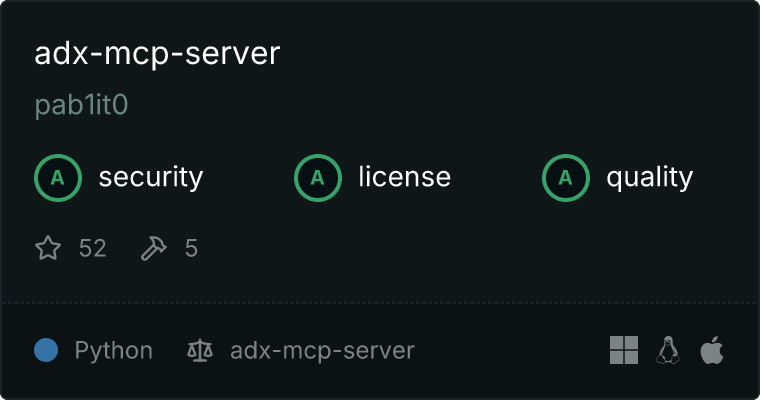Azure Data Explorer MCP Server

A Model Context Protocol (MCP) server for Azure Data Explorer.
This provides access to your Azure Data Explorer clusters and databases through standardized MCP interfaces, allowing AI assistants to execute KQL queries and explore your data.
Features
The list of tools is configurable, so you can choose which tools you want to make available to the MCP client. This is useful if you don't use certain functionality or if you don't want to take up too much of the context window.
Usage
Login to your Azure account which has the permission to the ADX cluster using Azure CLI.
Configure the environment variables for your ADX cluster, either through a .env file or system environment variables:
# Required: Azure Data Explorer configuration
ADX_CLUSTER_URL=https://yourcluster.region.kusto.windows.net
ADX_DATABASE=your_database
- Add the server configuration to your client configuration file. For example, for Claude Desktop:
{
"mcpServers": {
"adx": {
"command": "uv",
"args": [
"--directory",
"<full path to adx-mcp-server directory>",
"run",
"src/adx_mcp_server/main.py"
],
"env": {
"ADX_CLUSTER_URL": "https://yourcluster.region.kusto.windows.net",
"ADX_DATABASE": "your_database"
}
}
}
}
Note: if you see Error: spawn uv ENOENT in Claude Desktop, you may need to specify the full path to uv or set the environment variable NO_UV=1 in the configuration.
Docker Usage
This project includes Docker support for easy deployment and isolation.
Building the Docker Image
Build the Docker image using:
docker build -t adx-mcp-server .
Running with Docker
You can run the server using Docker in several ways:
Using docker run directly:
docker run -it --rm \
-e ADX_CLUSTER_URL=https://yourcluster.region.kusto.windows.net \
-e ADX_DATABASE=your_database \
adx-mcp-server
Using docker-compose:
Create a .env file with your Azure Data Explorer credentials and then run:
docker-compose up
Running with Docker in Claude Desktop
To use the containerized server with Claude Desktop, update the configuration to use Docker with the environment variables:
{
"mcpServers": {
"adx": {
"command": "docker",
"args": [
"run",
"--rm",
"-i",
"-e", "ADX_CLUSTER_URL",
"-e", "ADX_DATABASE",
"adx-mcp-server"
],
"env": {
"ADX_CLUSTER_URL": "https://yourcluster.region.kusto.windows.net",
"ADX_DATABASE": "your_database"
}
}
}
}
This configuration passes the environment variables from Claude Desktop to the Docker container by using the -e flag with just the variable name, and providing the actual values in the env object.
Development
Contributions are welcome! Please open an issue or submit a pull request if you have any suggestions or improvements.
This project uses uv to manage dependencies. Install uv following the instructions for your platform:
curl -LsSf https://astral.sh/uv/install.sh | sh
You can then create a virtual environment and install the dependencies with:
uv venv
source .venv/bin/activate # On Unix/macOS
.venv\Scripts\activate # On Windows
uv pip install -e .
Project Structure
The project has been organized with a src directory structure:
adx-mcp-server/
├── src/
│ └── adx_mcp_server/
│ ├── __init__.py # Package initialization
│ ├── server.py # MCP server implementation
│ ├── main.py # Main application logic
├── Dockerfile # Docker configuration
├── docker-compose.yml # Docker Compose configuration
├── .dockerignore # Docker ignore file
├── pyproject.toml # Project configuration
└── README.md # This file
Testing
The project includes a comprehensive test suite that ensures functionality and helps prevent regressions.
Run the tests with pytest:
# Install development dependencies
uv pip install -e ".[dev]"
# Run the tests
pytest
# Run with coverage report
pytest --cov=src --cov-report=term-missing
Tests are organized into:
- Configuration validation tests
- Server functionality tests
- Error handling tests
- Main application tests
When adding new features, please also add corresponding tests.
Tools
| Tool |
Category |
Description |
execute_query |
Query |
Execute a KQL query against Azure Data Explorer |
list_tables |
Discovery |
List all tables in the configured database |
get_table_schema |
Discovery |
Get the schema for a specific table |
sample_table_data |
Discovery |
Get sample data from a table with optional sample size |
License
MIT
